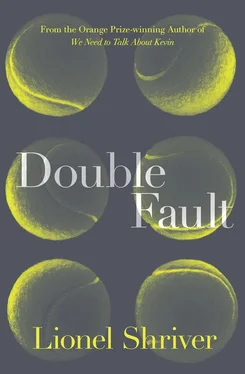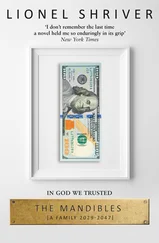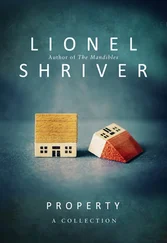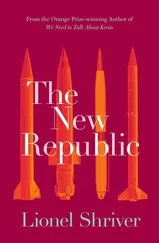They were drawing into Westbrook now, a small, tucked-away community on Long Island Sound whose property values were astronomical, but whose houses had been kept in families; the town retained its middle-class, unassuming character. Downtown, such as it was, included an ill-stocked drugstore with superlative homemade fudge, one Italian restaurant that overcooked its spaghetti, the obligatory military monument though few residents would remember to which war, and the beloved Muffin Korner, whose loose eggs, hot biscuits, and forgivably weak coffee cost $1.49. On the outskirts, where unprepossessing clapboards weathered by the shore, sturdy dowagers paddled the lapping surf in underwire swimsuits.
That Westbrook, Connecticut, was a steady, settled place may have inspired Max to select this location for Sweetspot. Pro tennis was such a roller-coaster, packing the events of what ought to have been a lifetime into perhaps ten frenzied years. It was sedative to bring students of age in an atmosphere of the reliable, the ongoing, and to coach them in the calming context of a place where tennis didn’t mean much—the public courts by the firehouse looked like landfill.
Desmond was asking her to take a look at his serve. Doubtless he was hoping that Willy would put in a good word for him with Max. Desmond was entering his last year, when his mentor would be either asking him to stay on or merely wishing him the best, and so would take incidental privileges like being trusted with a school car this evening as auspicious. Willy had the urge to warn him, bitterly, that her good word would have meant a great deal more six weeks before, but a stray grumble would ruin months of discretion. When she glanced again at Desmond’s yearning, mysteriously unwritten face, she ached. The first cut at Sweetspot was just the beginning of a cruel, sometimes savagely short process of elimination through which eagerness and even, by laymen’s standards, awesome ground strokes counted for nothing.
This counsel, too, she swallowed. Willy had heard the poor odds enough times from her father, and the remonstrance was hateful. Desmond would have to find out for himself the staggering unlikelihood that he should ever be ranked at all, much less be deciding, after his idol, whether to concede whites to the fusty All England Club.
Threading outside of town, they curled the drive of the school, whose buildings blended with Westbrook architecture: green-trimmed white clapboard Colonial Revivals, each skirted with a wide wooden porch. Below the overhangs, rockers listed with curled afghans, and wicker armchairs beckoned with quilted pillows, calling out for long, fractious games of gin rummy. Nothing about this lulling, serene laze suggested the sweat shed on these grounds except that it was two hours after the dinner bell and the porches were deserted. Any student worth his salt at eight o’clock was back on the courts.
Willy drifted into the dining hall, to spot her coach at a side table, next to the horrid Marcella Foussard. He was scraping up the last of his meal—so once again they would not be snuggling into their regular booth at Boot of the Med to pick languidly at flaccid linguine. Willy grabbed a tray, brightening her laughter. Max would see through her insipid vivacity without looking up. What a disaster. What an awful mistake, though she wasn’t certain which of them had made it.
The cafeteria betrayed that this was a sports academy and not a prep school. No vats of brick-solid cheese macaroni and liquefied kale; no lime Jell-O. Since Max had bought into high-protein theories, replacing the old saws about carbohydrates, they confronted skinless chicken breasts and lean flank steaks, undressed snow peas, and an inexhaustible mound of bananas. Facing down the bananas one more night, Desmond moaned, “You know, Agassi lives on junk food.”
Willy slid her tray next to Desmond on the side of the hall opposite from Max. She might have braved Max’s table if it weren’t for that Foussard creature, who surely spent more time on her nails—the back of her hand—than on her backhand. The hall recalled a mess in more ways than one, and Willy was frantic to get out. Shredding her chicken, she asked Desmond to hit a few after dinner. Ecstatic, Desmond chucked his flank steak merrily in the trash.
On the way out Willy forced herself to turn to Max’s table. He was watching her steadily. She wiggled two fingers. He didn’t wave back, his expression unreadable. She made a swinging motion and pointed at Desmond. Max dipped his chin a half inch, and as Willy swept through the screen door she at least had the satisfaction that with Marcella jabbering away Max had not heard a single word the silly girl said.
Sweetspot’s twenty hard and four clay courts were built right on the sound, which made them breezy. But Max believed in the strengthening of adversity. He’d situated his school in the Northeast because, he claimed, European civilization had surpassed southern cultures due to rigorous, hard winters. Cold had invigorated northerners to activity and enterprise, while tropical layabouts lounged beaches munching pomegranates. According to Max, Tahitians would never have invented tennis. But Willy was confident the whole pro-winter hoo-ha really just meant that Max hated Florida.
Stars were emerging, the glow from the powerful floods fissiparating into the salted air. The lights projected a blue halo that could be seen from miles away. Closer up, the bulbs produced a low-level collective hum, like a chorus finding its note before the song. As the floods on their four corners flickered, starting gray and warming to hot white, the court blazed with the tingling theatricality distinctive to playing at night.
“No, Desmond,” she declined when he challenged her to a match. “Let’s just hit.” The boy deflated. Later he might treasure his few offers of carefree rallies; now he craved a showdown. But Willy, for all her reputed keenness for head-to-head, tonight hankered for reprieve from a world with no choice but to vanquish or be vanquished. There had to be a haven in between.
“Why the cold shoulder?” Willy demanded. “I thought we were going to go back to the way it was.”
“I wasn’t the one who sat on the far side of the cafeteria,” Max returned coolly.
“I wasn’t the one who chose to eat in the cafeteria.”
They were in the library, which Max adopted as his lounge after lights-out. Though the kids instinctively hid their bottles in racket covers, there were no booze bans on the books; Max was treating himself to solitary bourbon.
Looking up, he closed Winston Churchill’s The Gathering Storm. “You expected that I would meet your train and scoop you off to Boot of the Med, where we’d order the fried calamari and Chianti and then—”
“We’d practice a few drunken overheads at midnight. Why not?” Willy’s T-shirt was limp with clammy sweat; she rubbed her arms.
“What would we talk about?”
“What we always talk about. Primpy Marcella, and your ex-wife, and … and we’d draw point diagrams on napkins before the zabaglione.” Her tone had taken a defeated turn. To Willy’s own ears, the reprise sounded ridiculous.
“Our agreement was not to ‘go back to the way we were’ but for me to ‘treat you like everyone else,’ which I had never done, from the time you were seventeen. So I could hardly go back to anything.”
“You’re always so aggressive and nasty lately.”
“I’ve always been aggressive and nasty. You used to like it. Don’t go soft on me, Will. It’s not good for your tennis.”
“Do you even care about that these days?” she entreated. “My tennis?”
“I thought it was for the sake of your goddamned tennis that we’ve had such unimpeachable relations for six weeks.”
Читать дальше












